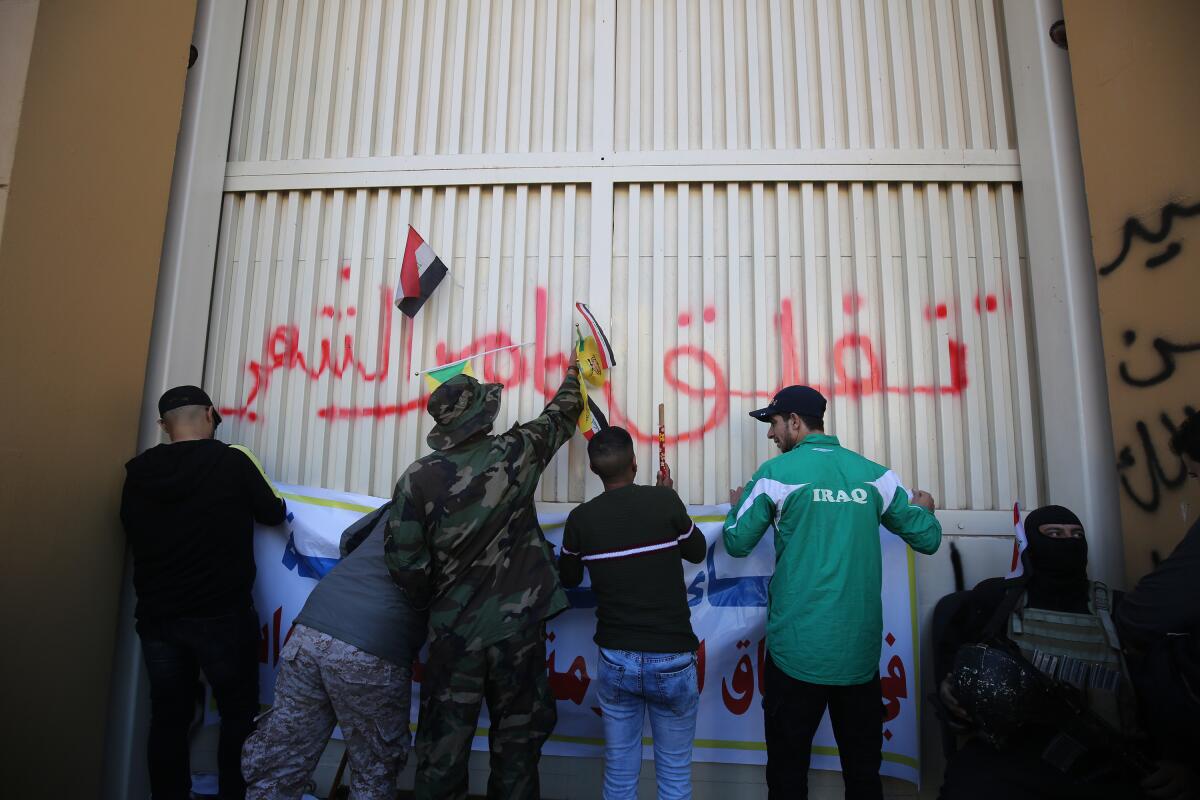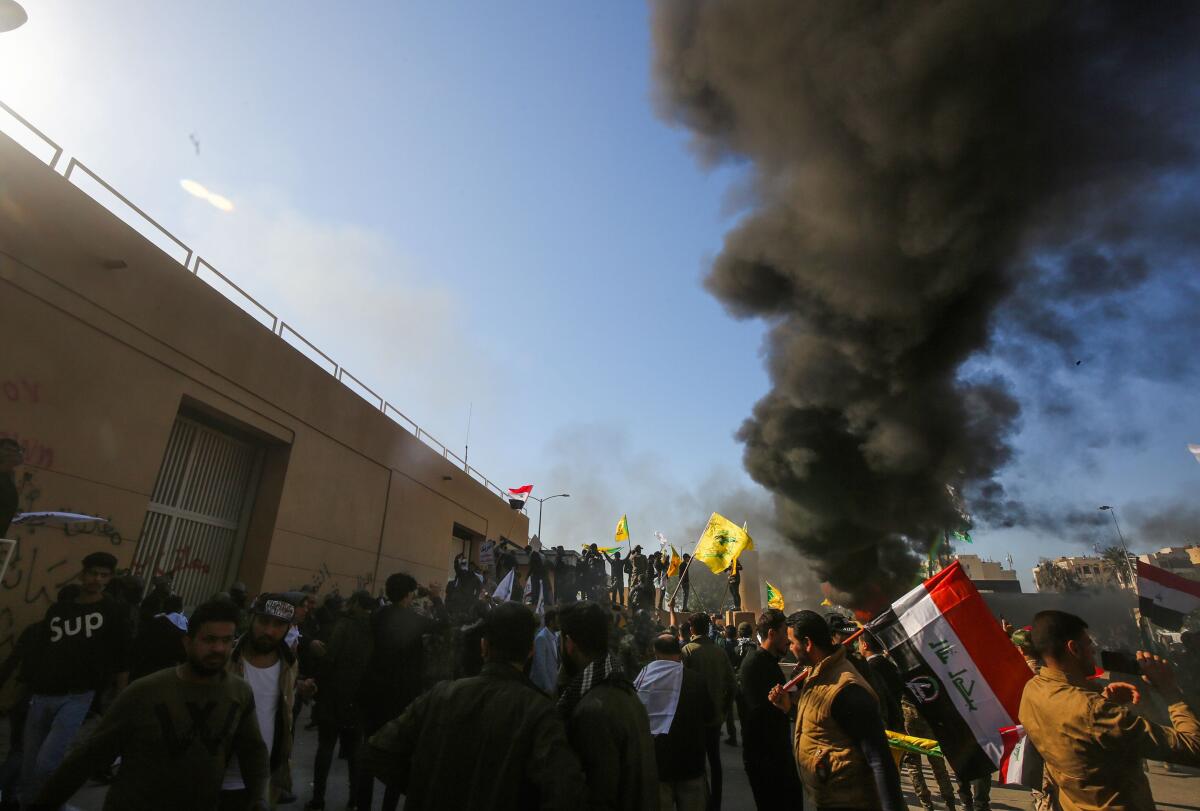Protesters attack U.S. Embassy in Baghdad after airstrikes; Trump says he’ll send reinforcements

- Share via
AMMAN, Jordan — Thousands of protesters aligned with an Iraqi paramilitary group stormed the compound of the U.S. Embassy in Baghdad on Tuesday, surrounding some of its buildings and setting fire to one of its gates.
The spasm of rage came two days after U.S. warplanes struck positions of Kataib Hezbollah (the Hezbollah Brigades), a top paramilitary faction that is backed by Iran. The strikes killed some 25 people and wounded 51 others, Iraqi officials said, and followed a rocket strike last week that killed a U.S. military contractor, which the United States blamed on Kataib Hezbollah.
Sirens blared through Baghdad’s heavily fortified Green Zone as an enraged mob bristling with the green-and-yellow flag of Kataib Hezbollah and other factions of Iraq’s Popular Mobilization Units, a volunteer force of Shiite-dominated armed groups, pelted the embassy with rocks and water bottles.
Others shouted, “God is great, and America is the great Satan,” scaled walls and surrounded a reception area with U.S. soldiers standing inside. One protester sprayed “Closed by order of the people” on the wall of the embassy’s compound, and another held up a sign threatening the “American enemy.”
In response, U.S. Apache helicopters flew over the protesters at the embassy walls and fired flares. U.S.-led coalition spokesman Col. Myles Caggins tweeted a video that showed an Apache launching the flares that lighted up the night sky.
Defense Secretary Mark Esper announced Tuesday that the Pentagon would send about 750 soldiers from the Army’s 82nd Airborne Division at Ft. Bragg, N.C., to the Middle East.
Additional forces from the division’s Immediate Response Force are prepared to deploy over the next several days, he said in a written statement.
“This deployment is an appropriate and precautionary action taken in response to increased threat levels against U.S. personnel and facilities, such as we witnessed in Baghdad today,” Esper said. “The United States will protect our people and interests anywhere they are found around the world.”

President Trump made a brief stop at his golf course in West Palm Beach, Fla., in the morning, leaving after less than an hour. His departure came at roughly the same time the Pentagon announced it would deploy more forces to the embassy in Baghdad.
The State Department said it did not plan to evacuate the embassy, describing U.S. personnel there as “secure.” The State Department also said that Matt Tueller, the U.S. ambassador to Iraq, was returning to the embassy after “previously scheduled personal travel.”
Crowds began forming after funerals earlier Tuesday for those killed in last week’s strikes, making their way to the Green Zone and passing several checkpoints on their way to the embassy. It was unclear how they had breached the high-security area, which is home to a number of embassies, international nongovernmental organizations and Iraqi ministries. (Anti-government protesters demonstrating in recent weeks had been unable to enter.)
As the mob turned violent, Iraq’s caretaker prime minister, Adel Abdul Mahdi, issued a statement demanding protesters leave the embassy grounds, and troops were deployed to try to push back the protesters.
“We remind that any attack or harassment of embassies and diplomatic missions is an act that will be strictly prevented by security forces and will be severely punished by the law,” the statement said.
But Abdul Mahdi’s warning had little effect, despite security forces attempting to disperse the protesters with tear gas and stun grenades. Hours later, crowds near the embassy appeared to be growing, while Iraqi politicians affiliated with the Popular Mobilization Units joined the fray, including Qais Khazali, leader of the Asaib Ahl Haq faction; Jamal Ibrahimi, deputy head of the group of militias; and Hadi Ameri, head of the Badr Organization. All are seen as important allies of Iran in the country.
According to the White House, Trump spoke to Abdul Mahdi on Tuesday, and the two leaders discussed regional security issues, with Trump emphasizing the need to protect U.S. personnel and facilities in Iraq.
“This protest was to deliver a message that this embassy should be closed and that the presence of U.S. forces in Iraq is illegitimate,” said Kataib Hezbollah spokesman Mohammad Muhi in a phone interview Tuesday. He added that the U.S. strikes were “a crime” that “violated Iraqi sovereignty, insulted Iraqi dignity and made light of Iraqis’ blood.”
Fury over the airstrikes went far beyond Iraqis who back Iran and crossed political lines, sinking the United States into its most dangerous crisis in Iraq in years and handing the Trump administration an extremely delicate and volatile dilemma.

With much of the American public haunted by memories of Iran taking U.S. Embassy staffers as hostages 40 years ago, U.S. officials will be under intensified pressure to withdraw their troops from Iraq.
But although Trump previously promised to do just that, officials worry that withdrawal now would appear to be a capitulation to demonstrators they have labeled “terrorists.”
And that would also probably lead Iran to claim victory at having driven out the U.S. military and to expand more freely its influence in Iraq.
For now, Trump has forced a situation that allowed Iraqis to be galvanized not by hatred of their government and Iran, but of the United States. Critics said it was a self-inflicted wound that could trigger an even deadlier escalation.
“Responding to attacks on U.S. troops by Iranian Shia militias was entirely justified,” Ilan Goldenberg, a Middle East expert at the Center for a New American Security, said on Twitter. “But killing 24 and injuring more than 50 was disproportionate and has now caused a backlash.”
There are roughly 5,000 U.S. troops in Iraq and an unknown number of contractors involved in anti-Islamic State operations as well as in training and assisting missions with Iraqi security forces. Their presence has long been a target for Iraqi politicians aligned with Tehran.
Trump condemned the unrest near the embassy while blaming it on Iran.
“Iran killed an American contractor, wounding many. We strongly responded, and always will. Now Iran is orchestrating an attack on the U.S. Embassy in Iraq,” he tweeted.
“They will be held fully responsible. In addition, we expect Iraq to use its forces to protect the Embassy, and so notified!”
Later Tuesday, even though the crisis was far from over and groups of protesters continued to surround the compound, Trump sent another tweet to boast he had kept the embassy safe. He credited “our great Warfighters” and “the most lethal military equipment in the world” that was rushed to the site.
“The Anti-Benghazi!” he said, alluding to the 2012 attack on two U.S. compounds in Benghazi, Libya, in which the U.S. ambassador and three other Americans were killed.
The Benghazi incident became an enormous political issue that Republicans, including then-Rep. Michael R. Pompeo — now secretary of State — used to vilify Democrats and especially Hillary Clinton, who was secretary of State at the time.
Trump added another admonition for Iran. “Iran will be held fully responsible for lives lost, or damage incurred, at any of our facilities,” he wrote. “They will pay a very BIG PRICE! This is not a Warning, it is a Threat. Happy New Year!”
Pompeo worked the phones Tuesday, speaking with Iraq’s prime minister and president.
According to a State Department spokeswoman, Pompeo “made clear the United States will protect and defend its people,” and the Iraqi leaders said they “took seriously their responsibility” to ensure the safety of the U.S. Embassy.
The previous day, Pompeo spoke with Saudi Crown Prince Mohammed bin Salman, Abu Dhabi Crown Prince Mohammed bin Zayed al Nahyan of the United Arab Emirates, and Israeli Prime Minister Benjamin Netanyahu — all avowed opponents of Iran.
It’s likely that the violence will increase tensions between Washington and Tehran, one of the few consistent elements of Trump’s foreign policy.
Tuesday’s unrest comes amid weeks of anti-government demonstrations that saw Iraqis across the country call for the ouster of the ruling class and an end to interference in the country’s affairs by the U.S. and Iran. (Since 2003, Tehran and Washington have clashed for influence in Iraq.)
The Popular Mobilization Units, which include Kataib Hezbollah, are seen as a part of Iran’s influence, even though they have been reluctant partners of the U.S. in the fight against Islamic State. They were formed as a Shiite-dominated volunteer auxiliary force in 2014 to counter Islamic State’s scythe-like takeover of a full third of the country, but have since been integrated into Iraq’s armed forces and have become a powerful political party.
Bulos reported from Amman and Wilkinson from Washington. Times staff writer Chris Megerian in Washington contributed to this report.
More to Read
Sign up for Essential California
The most important California stories and recommendations in your inbox every morning.
You may occasionally receive promotional content from the Los Angeles Times.












